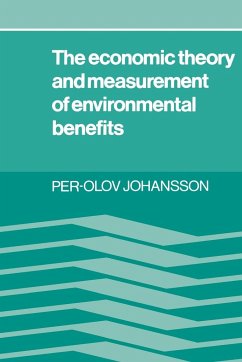
The Economic Theory and Measurement of Environment Benefits
Versandkostenfrei!
Versandfertig in 1-2 Wochen
45,99 €
inkl. MwSt.

PAYBACK Punkte
23 °P sammeln!
This book is an advanced text in welfare economics and its application to environmental economics. It provides, in the first chapters, a comprehensive survey of developments in the theory of measurement of welfare, and then applies this theory to environmental economics. The first part derives consumer surplus measures to be held in a timeless world. Throughout the emphasis is on the circumstances in which a money measure correctly reflects the underlying utility change. Four main cases are considered: unrationed private goods, rationed private goods, public goods or externalities, and discret...
This book is an advanced text in welfare economics and its application to environmental economics. It provides, in the first chapters, a comprehensive survey of developments in the theory of measurement of welfare, and then applies this theory to environmental economics. The first part derives consumer surplus measures to be held in a timeless world. Throughout the emphasis is on the circumstances in which a money measure correctly reflects the underlying utility change. Four main cases are considered: unrationed private goods, rationed private goods, public goods or externalities, and discrete choices. Reviews of practical methodologies for the calculation of consumers' surplus for these classes of goods are also given. The second part looks at intertemporal issues. In particular, it derives comsumer faces risk and uncertainty. The book is intended for advanced courses in environmental and welfare economics, and as a reference work for those interested in the theory of measurement of welfare and its application to environmental economics.
Table of contents:
Preface; 1. Introduction; 2. Some basic concepts; 3. The concept of consumer surplus; 4. Topics in the theory of consumer surplus measures; 5. Consumer surplus measures in quantity-constrained regimes; 6. Public goods and externalities in consumption; 7. How to overcome the problem of preference revelation; practical methodologies; 8. Discreet choice models and environmental benefits; 9. Consumer's surplus in an intertemporal context; 10. Welfare change measures in a risky world; 11. Money measures of the total value of environmental aspects; Notes; Bibliography; Index.
This advanced text in welfare economics provides a comprehensive survey of developments in the theory of measurement of welfare, and then applies this theory to environmental economics.
This book is an advanced text in welfare economics and its application to environmental economics.
Table of contents:
Preface; 1. Introduction; 2. Some basic concepts; 3. The concept of consumer surplus; 4. Topics in the theory of consumer surplus measures; 5. Consumer surplus measures in quantity-constrained regimes; 6. Public goods and externalities in consumption; 7. How to overcome the problem of preference revelation; practical methodologies; 8. Discreet choice models and environmental benefits; 9. Consumer's surplus in an intertemporal context; 10. Welfare change measures in a risky world; 11. Money measures of the total value of environmental aspects; Notes; Bibliography; Index.
This advanced text in welfare economics provides a comprehensive survey of developments in the theory of measurement of welfare, and then applies this theory to environmental economics.
This book is an advanced text in welfare economics and its application to environmental economics.




